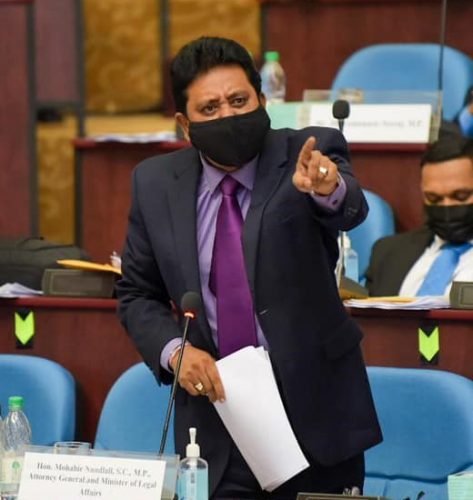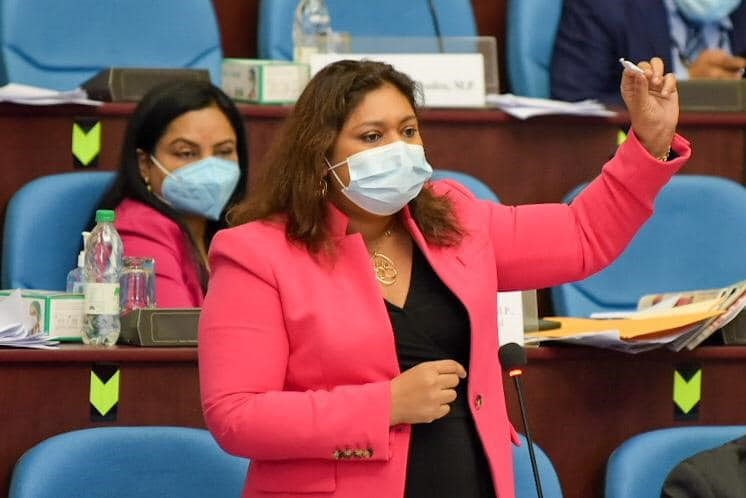A government bill that seeks to remove custodial sentences for the possession of less than 30 grammes of cannabis was sent to a select committee of Parliament on Thursday while an opposition motion to introduce a separate bill setting the no-jail amount at 500 grammes was defeated.
The APNU+AFC motion which was presented by Sherod Duncan was thrown out after several hours of debate at the Arthur Chung Conference Centre.
The government benches supported the bill bought by Attorney General and Minister of Legal Affairs Anil Nandlall which intends to eliminate custodial sentences for possession of less than 30 grammes of cannabis.

During the introduction of his motion for the presentation of a bill to amend the Narcotic Drugs and Psychotropic Substances (Control) Act, Duncan noted that thousands of Guyanese are incarcerated for the possession of small quantities of a “piece of plant”.
He said they suffer jail time as a consequence for marijuana use and many after their first experience with the law resolve to continue along the path of crime as a way of life.
Duncan’s bill sought to increase the amount of cannabis which constitutes a trafficking offence from the existing quantity of 15 grammes to 500 grammes. The motion was submitted to the National Assembly in December, 2020.
The opposition motion had come although APNU+AFC failed in its five-year term in office to decriminalise small amounts of marijuana.
The coalition had said that the inactivity of the National Assembly in 2019 due to the passage of the no confidence motion on December 21, 2018 prevented MPs from the Alliance for Change (AFC) segment of the governing coalition from being able to successfully pilot the amendment of the Narcotic Drugs and Psychotropic Substances (Control) Amendment Bill.
Duncan deemed their bill as a “prayer answered” for many citizens and “justice done”.
The debate on the motion commenced around 11 am and went on up until 3pm.
After the Opposition motion to introduce the bill was rejected by the house, Nandlall stood and presented his bill for the first time to the House. He also asked that it be transmitted to a Special Select Committee for further consultation.
Leading the list of speakers, Minister of Education Priya Manickchand, who sported what appeared to be the replica of a joint described Duncan’s proposal as the “epitome of sanctimonious gangsterism”.
She said the bill that Duncan proposed to bring was identical to one which was drafted by attorneys Mark Waldron and Nigel Hughes some time ago. “Identical in every regard except for the amount of cannabis that the bill seeks to address,” Manickchand said.
“…It is a lazy attempt at a draft. No effort. No effort to attempt even to examine and interrogate the issues that they are trying to resolve for fellow Guyanese,” she argued.
Minister of Culture, Youth and Sports Charles Ramson Jr noted that the opposition bill proposed to move the decriminalization of possession of marijuana from the existing 15 grams to 500 grams.
This, according to Ramson shows that no research was conducted before the proposal of the bill.
“It is totally irresponsible. It is ludicrous to suggest such a dramatic shift and then on top of that you do not represent the majority of views in this House and that does not represent the majority of positions of the people in this country,” Ramson stated.
He noted that when in Government and charged with the affairs of the people, one cannot conduct experiments with people’s lives. “Especially young people”, he said.
Failed
Nandlall’s bill states that it aims to reduce recidivism, prison overcrowding and the burden on the criminal justice system, save State funds, and ultimately rebuild lives, families and communities affected and disadvantaged by the fining and incarceration of persons, especially youths, for possession and use of small amounts of cannabis.
During his debate on the opposition motion, Nandlall stated that it would not be passed by the Government side. He noted that the coalition had been in office from 2015 to 2020 but had failed to pass the amendments.
“We don’t want on this side for anyone to feel that we are using our majority and our numerical strength to vote down motions or bills or any policy. We are going to show reason why and that is what every member of this side has been doing from the beginning of the debate,” Nandlall said.
He also contended that the opposition bill was replete with mistakes as it failed to amend associated laws in order to make it more “comprehensive and fluid”.
The AG said that the opposition bill proposed to permit possession of 500 grammes of marijuana to be legal but failed to amend the law to allow the use of the drug to be legal.
“….You have a whole set of related offences that they have not amended either. So, it can be lawful for you to have the cannabis but you can’t smoke it. You can’t inhale it. You can’t light it”, Nandlall said as he and other members from the Government benches chuckled.
MP Lenox Shuman of the Liberal and Justice Party, which is part of the three-party list joinder, also did not support the passing of the opposition motion.
For such a motion to be supported, Shuman said it has to be done with a science-based approach and it had to reflect the realities of the Guyanese society.
“We cannot sit there and permit all of our society, all of our young people to be walking around with one kilogramme of marijuana every single day. When we get to that point then all of our society descends into chaos…our structures start to deteriorate, our families start to fail and the entire Guyanese society suffers from a systemic breakdown,” Shuman argued.
Shuman, also the Deputy Speaker, said that he found the bill “offensive” not only to the public but also to the “people who depend on parliamentary representatives to address their issues in this House”.
“There is only one thing that travels at the speed of light and that is light in itself and it takes millions of years to get anywhere cross the galaxy but we cannot as a country go from zero to the speed of light just because some disingenuous members decide that they want the country to go that way,” the Deputy Speaker said.
APNU+AFC member and former Minister of Public Security Khemraj Ramjattan said it is evident that the opposition will get no support from Government on the proposed bill.
As such, he said the next best thing is to increase the amount allowed in possession to avoid custodial sentences.
“…..Whatever we are trying to do here, I want this entire parliament, Government benches and opposition benches to understand what is the best solution to the problem…To work out a scenario that especially happens with poor, young people and they are getting custodial penalties,” Ramjattan said.
In his closing remarks, Duncan accused the Government of seizing the coalition’s move to “free up the weed.”
“The PPP/C continues to steal APNU+AFC projects and initiatives and this is one such initiative,” he declared.
Explanatory memorandum
According to the Explanatory Memorandum of Nandlall’s bill, under the new subsection (2A) the possession of a quantity of cannabis or any substance held out to be cannabis which does not exceed fifteen grammes is punishable by mandatory counselling for a period to be determined by the counsellor. Under (2B) the possession of any quantity of cannabis or any substance held out to be cannabis which exceeds fifteen grammes but does not exceed thirty grammes is punishable by community service which includes employment in a public work under the Extra-Mural Work Act, Cap. 11:02, for a period not exceeding six months.
Clause five seeks to amends section 5(2)(e) to increase the quantity of cannabis, in relation to the burden of proof being placed on a person to prove that the person is not in possession of cannabis for the purpose of trafficking, from more than fifteen grams to more than thirty grammes.
Clause six seems to amends section 12 to remove the fine and term of imprisonment for the smoking, inhaling, sniffing, or otherwise using cannabis, being found in a place used for that purpose, or being the owner, occupier, or concerned in the management of any place used for preparation of cannabis for that purpose. The amendment also seeks to remove the penalty for the possession of any pipe or other utensil used in connection with the smoking, inhaling or sniffing or otherwise using of cannabis.
These offences are now punishable by community service for a period not exceeding six months. In addition, the offence of handling any package, container or other thing which contains a quantity of cannabis not exceeding fifteen grammes, is now punishable by mandatory counselling for a period determined by the counsellor. Where the package, container or thing has a quantity of cannabis or any substance held out to be cannabis which exceeds fifteen grammes but does not exceed thirty grammes the offence will now be punishable by community service which includes a public work under the Extra-Mural Work Act, Cap. 11:02, for a period not exceeding six months in relation to cannabis and a period not exceeding three months in respect of the substance.
Further, while the clause seeks to expunge the fine and term of imprisonment for smoking cannabis, it also prohibits the smoking of cannabis in certain places in line with the prohibition of smoking in public places provided for under section 16 of the Tobacco Control Act, No. 17 of 2017, and is punishable by the same fines found in that Act in addition to the penalty herein.
Clause Seven seeks to amend section 72 in relation to the discretion of the court to order a person convicted of an offence under section 4, who is an addict and in possession of cannabis for personal consumption, to undergo rehabilitation where the court thinks fit, of the period of the community service.
Clause eight also seeks to amend section 73 in relation to the limitation on the power of the court to impose a lesser sentence to remove the special reason for the discretion of the court to reduce the term of imprisonment for the possession of five grams for personal consumption as the provision is no longer necessary. The clause also seeks to substitute subsection (5) to provide for the court to make an order for mandatory counselling for a period within the period the person is performing community service where no order for care, treatment and rehabilitation of person addicted to a narcotic is made under section 72.
The bill also inserts new subsections (6), (7), (8) and (9). Subsections (6) and (7) prescribe the hours and instances for the undergoing of mandatory counselling and the performance of community service. Subsections (8) and (9) cater for instances in which the offender does not consent to an order for mandatory counselling and community service to be granted and where the requirements of an order to undergo mandatory counselling or perform community service is breached by the offender to give the court the discretion to order the offender to pay a fine of two hundred and fifty thousand dollars, where the court sees fit.






